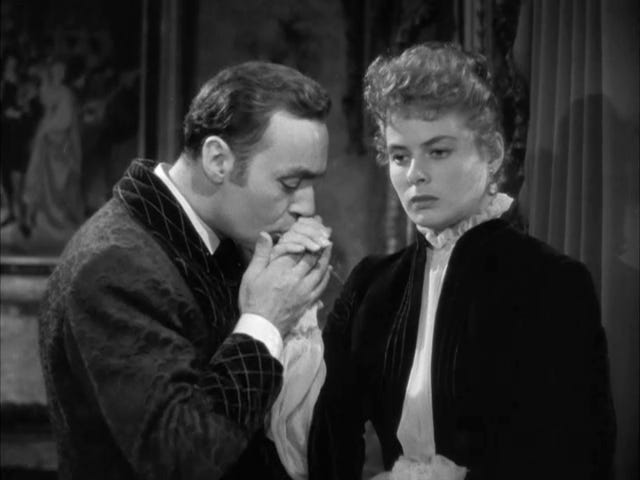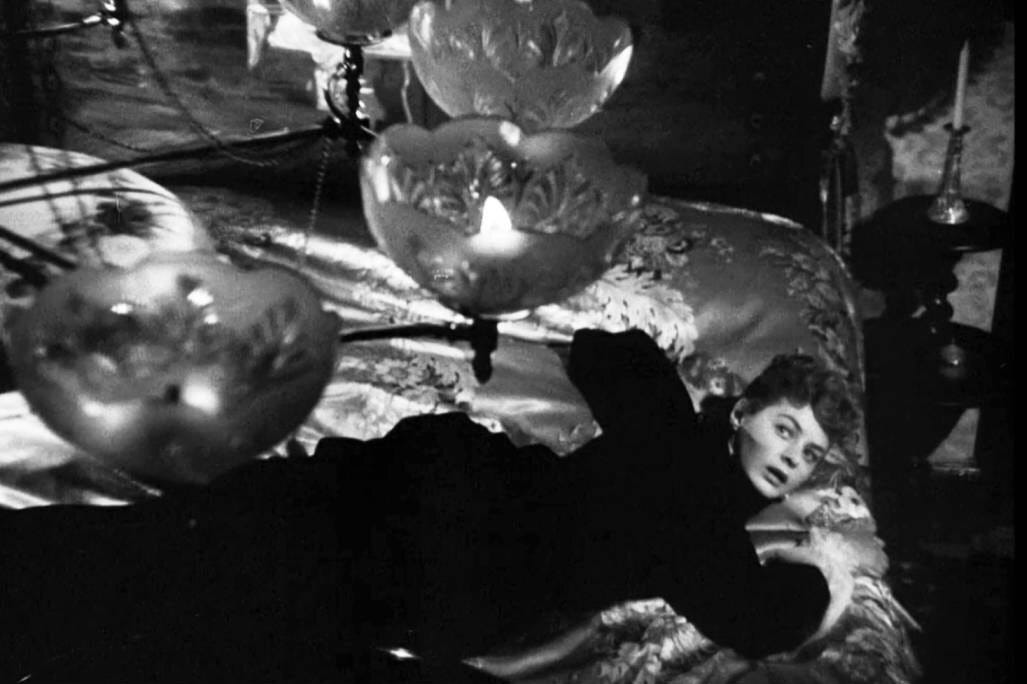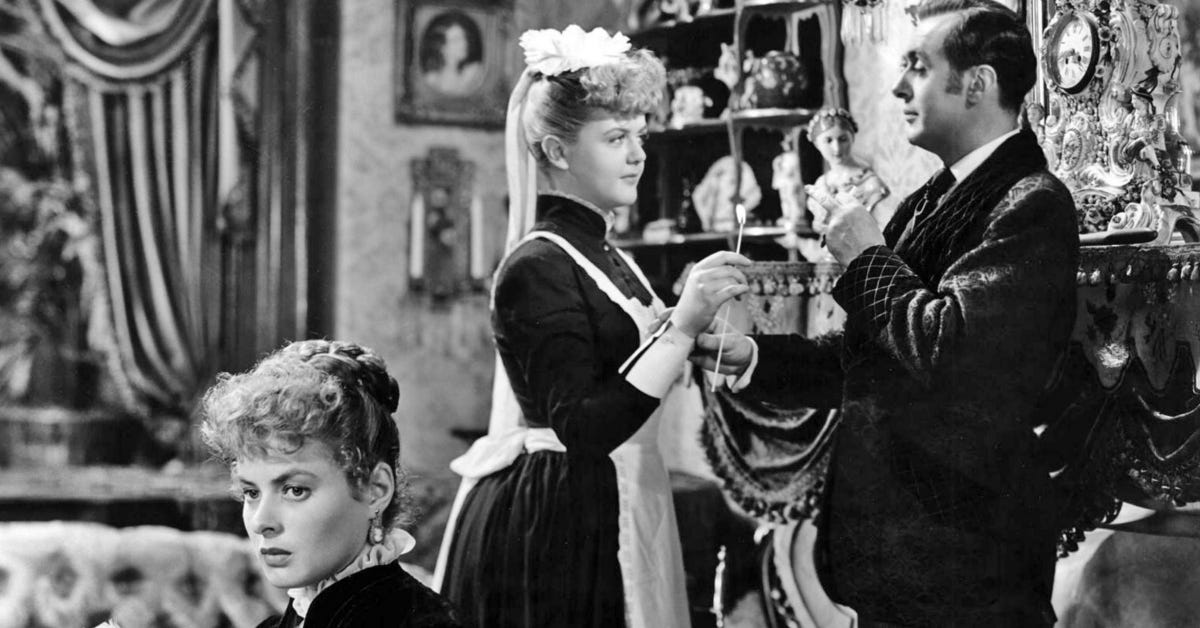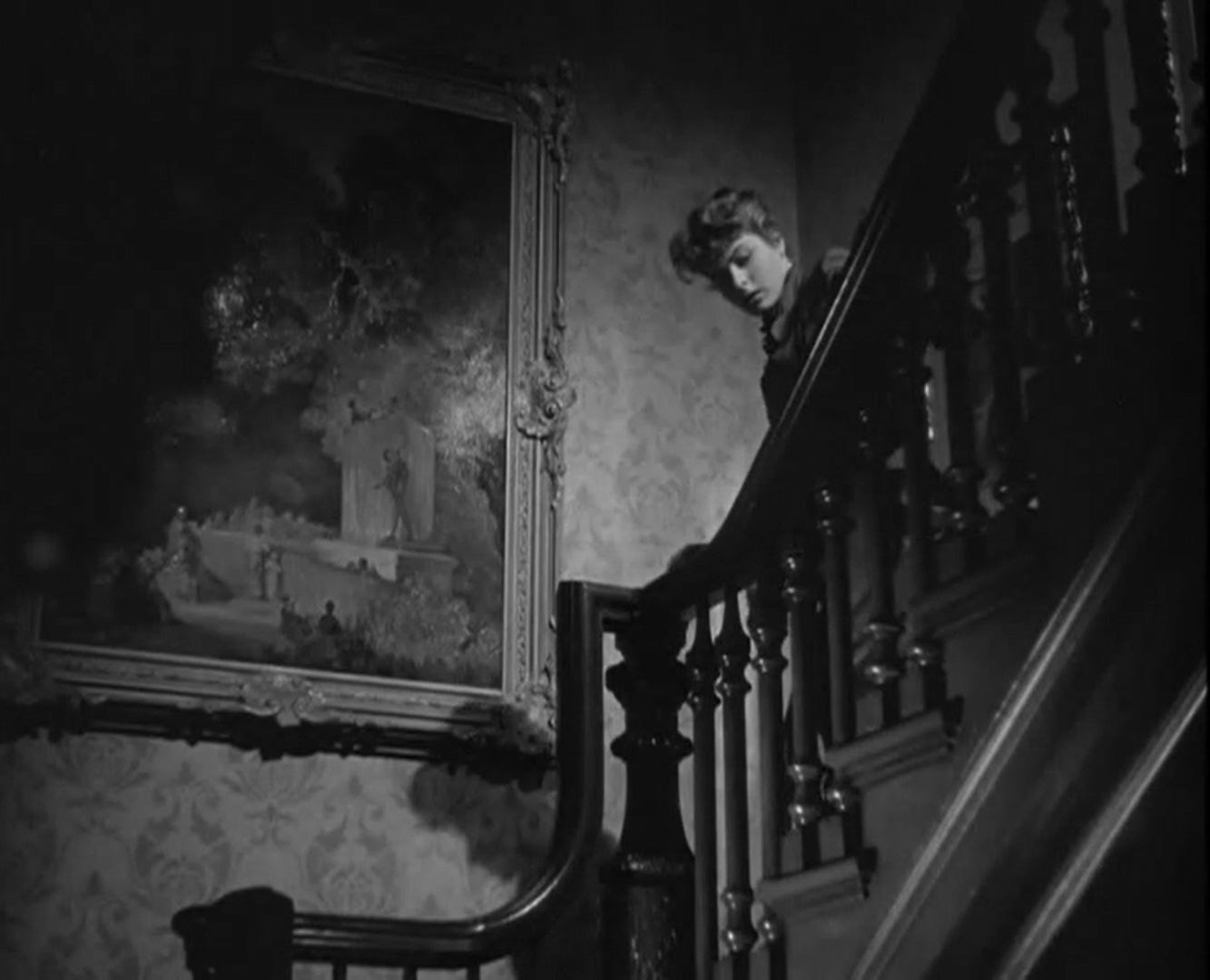A Portrait of Narcissistic Manipulation in "Gaslight" (1944)
A classic film that achieves a remarkably accurate depiction of emotional and psychological abuse
I first saw Gaslight (1944) quite a long time ago, probably as a teenager, and it didn’t make a huge impression on me. It was adequately suspenseful and atmospheric, perhaps seemed a bit fanciful. I could see that it was good filmmaking but I wasn’t interested enough to watch it again.
Then about two years ago I saw Gaslight for a second time. This time, with certain life experiences accumulated, I was powerfully struck by what a remarkably accurate portrayal of narcissistic emotional manipulation the film actually achieves. It’s something that one often doesn’t have the power to recognize unless one has experienced or witnessed it for oneself…but once you do have that experience, you recognize the patterns instantly.
What do I mean by narcissist? Without referencing technical terms, I’m going to give you the simplest layman’s definition I’ve been able to formulate for myself: a person who never, ever, in any circumstances of any relationship, is acting in good faith. The narcissist’s behavior and emotions are calculated surface expressions of things that they are incapable of doing or feeling sincerely. Even incidents or periods of apparently kind behavior have an ulterior motive of emotionally manipulating their victims—of confusing them, throwing them off-balance; of making them behave the way the narcissist wants them to behave. The narcissist is incapable of a normal human relationship—to them the other person is always a puppet or pawn; life is a chess-match that they always need to win.
That being said, let’s take a look at how the facets of a relationship with a narcissistic person play out within the drama of Gaslight.
For anyone who hasn’t seen the film, note that I’ll be discussing
many scenes in detail and giving away all but a few plot points.The Red Flags
A rushed, whirlwind beginning to a relationship—Gregory (Charles Boyer) and Paula (Ingrid Bergman) have only known each other two weeks before they marry; he lavishes her with overwhelming affection (sometimes referred to as “love bombing”) and hurries her into the decision to accept his proposal—as well as violating her boundaries by following her to Lake Como after he had promised to give her a week alone to make up her mind.
Gregory presents himself in the light of an escape/rescuer/salvation from Paula’s troubled and fearful past. This is very artistically illustrated in the train scene—when Miss Thwaite (Dame May Whitty) unwittingly stirs up Paula’s childhood memories of her aunt’s murder, Paula becomes disturbed and anxious (emphasized by her being “trapped” in the train compartment), and then as soon as she steps out of the train, Gregory is on the spot waiting for her and she literally runs into his arms.
The “transactional” nature of an abusive relationship is hinted at in the scene where Paula talks about how loving and marrying Gregory has made her happy and less fearful, and Gregory tells her about his dream of living in London—by the end of the conversation she has decided she ought to do something to “repay” him by going to London and living in the house she hates.
The Destabilizing Tactics
The overall emphasis of Gaslight is on one of the key elements of abusive relationships: changing the way the victim sees themselves, making them doubt themselves and feel something is wrong with them; even to question the very reality of things they have seen or experienced. Gregory continually, repeatedly tells Paula worrying things about herself—you’re forgetful, you lose things, you’re not well, you’re tired—until she begins first to wonder if they are true and eventually to believe those things about herself, and finally is ready to believe anything Gregory tells her. He takes this tactic even further by literally manipulating circumstances: hiding things and telling her she’s lost them or took them without remembering, and denying that things she has heard and seen (the gaslight going down, the noises in the attic) exist.
But there is a whole range of further manipulative tactics on display. Some of the others we see include:
Rapid alteration between harsh behavior and sudden affection or treats, which teaches the victim to always be trying to tailor their behavior so they will receive good treatment. For example, Gregory’s sudden “gift” of promising to take Paula to the theatre after having been tormenting her just a minute before makes her so grateful that she actually apologizes for having tried to protest against his cruelty. He then immediately upsets her equilibrium again by accusing her of taking down the missing painting, and ultimately taking away the “treat” of going to the theatre.
Twisting Paula’s own words to use against her. For instance, after she objects to his being too familiar with Nancy, he casts up to her that she was the one who wanted to treat the servants as equals (when all she had done was say they should be considerate of the servants by not giving them unnecessary extra work).
Refusing Paula’s requests, and then switching around and pretending that he would have granted them if he’d only known she wanted them so badly or if she’d asked differently (e.g., when he refuses to let her see Miss Thwaite), so that Paula is made to feel she is the one who actually did something wrong, or failed to communicate. This increases her sense of helplessness and the impression of something being wrong with her.
Isolation—a massive aspect of narcissistic abuse. Paula is prevented from going out, kept from having visitors or seeing anyone at all, and feels she has to account to her husband for where she has been or who she sees, until she becomes so sensitive about this that she gives up trying to go out at all.
Any sign of a victim sensing that something is wrong can also be turned to manipulative effect. Whenever Gregory loses control or goes too far in harshness for a moment, to the point where he sees Paula is startled or begins to question his actions, he immediately turns it around with a display of affection and explains his behavior as arising from concern or worry for her, or something done “for her own good.”
The Use of Others
The narcissist also manipulates other people’s treatment of his victim, often shaping their perceptions so effectively that they come to see the victim as the difficult or troublesome person in the relationship. Some outsiders become willing participants in persecution of the victim (this type are sometimes referred to as “flying monkeys”), while others are completely unaware that they are being used. Gaslight abounds with examples of this as well:
Subtly planting ideas about the victim in other people’s minds behind the victim’s back. We see Gregory hinting to the servants that Paula is unwell, that there is possibly something wrong with her; impressing a sense of oddity on them by telling them how particular she is about certain things. He deliberately chooses a maid, Nancy (Angela Lansbury) whose personality will allow him to easily set her against Paula and make Nancy treat her impertinently. Nancy becomes his ally without realizing she is being manipulated herself, though she also seems to enjoy tormenting Paula (a classic example of a “flying monkey”).
Humiliation: making the victim look bad in front of other people. A classic example is the scene where Gregory first deliberately puts Paula in a situation where she wants to put coal on the fire—note how Paula’s fear of waking her husband by tending to the fire emphasizes how sensitive she’s become to his criticism—insists she call the maid to do it, and then makes her give the order to the maid herself, so it appears that Paula is the one calling unnecessarily on the servants for trivial tasks. In the scene where he calls in the servants to swear they didn’t take down the missing painting, he asks Paula in front of Nancy if she is willing to take Nancy’s word—making it sound as if Paula is the one who suspected the servants of stealing the painting.
Elizabeth, the cook (Barbara Everest), is an example of how kind, well-meaning people can be unaware of the manipulation going on around them and even inadvertently be involved in it. Her literal deafness is a metaphor for her unawareness. She does sense that something is slightly “off” or puzzling about the hints Gregory plants in the servants’ minds regarding their mistress, but doesn’t realize what’s really happening until she has it very plainly demonstrated to her.
(As an aside, my favorite moment in the movie is when Elizabeth does finally see the truth for herself. Everest’s “Yes, sir, I see exactly how it is,” has to be one of the most satisfying line deliveries in all of film.)
The Results
The result of narcissistic emotional and psychological abuse is a changed personality in the victim—or more accurately, a subconscious suppression and smothering of their own true personality as a survival tactic. The viewer of Gaslight sees, as friends and relations might have seen if Paula had any, how she goes from a normal, happy, carefree woman to a dazed, cringing, nervous woman afraid of her own shadow. Contrast the early scene showing Paula coming down the stairs of the London house, glowing and happy and dressed for an outing, with the striking shot of her creeping down to peer over the banister like a frightened child or animal when Cameron (Joseph Cotten) comes to see her near the end.
(Though this is only shown by inference, Paula also seems to give up her own pursuits and interests after marrying Gregory and moving into the London house—something that often happens to victims of a narcissist. Her love of music is clearly shown by her rapt expression at the musicale, and she talks of keeping her aunt’s scores out in case she wants to sing again and study them, but she is never seen pursuing her music after her marriage.)
Note that there is a point where Paula tries to assert herself slightly—she does hold her ground and insist on going to Lady Dalroy’s because it is important to her, and asserts her authority with Nancy in a small way and is clearly pleased by the feeling it gives her. But it isn’t enough: she is not capable of continuing to stand up for herself because she doesn’t realize the tactics being used against her.
Toward the climax of the film, Gregory tells Paula that she completely imagined finding the incriminating letter on their first day in the house. A key point here is, at that early stage, when Paula was her own natural self, he could never have gotten away with turning to her a day, an hour, or a few minutes after taking the letter from her and saying “there was no letter: you only imagined it.” She would never have believed him then. He has to break down her trust in her own senses over time and make her completely doubt herself before he can put this over on her.
So completely does he succeed that when Paula is finally told the truth about what Gregory really is and what he is doing to her, she initially cannot believe it, protesting that it can’t be, that he’s her husband, that he wouldn’t do such a thing. (This highlights an important factor in why people can be vulnerable to emotional abuse: it so frequently comes from someone close to them, such as a parent or spouse, whom they would naturally expect to be able to trust—rather than an enemy against whom they would be on their guard.) She has been made to believe that she is the problem, to accept the manipulator’s version of reality.
The script’s use of the contrasting words “dreaming” and “awake” is an effective metaphor for the state of mind of a victim of manipulation versus someone who is aware of what’s happening to them. In the scene when Gregory, thinking that Paula was the one who opened his desk, is momentarily worried that she actually knows more than she has let on, he insists to himself that she must have been “awake” to have done it.
The limitations of film
A film dramatization of any human behavior or relationship has its natural limitations. Gaslight must compress a process of mental and emotional destabilization that takes months, years, into the limits of a two-hour movie. The drastic changes in Paula may seem implausible because the audience sees them unfold in five or ten minutes of film, but in life, emotional abuse is an insidious process, slowly and sometimes imperceptibly achieved.
A similar point can be made about the post-climax scene in the attic where Paula resists Gregory’s attempts at persuading her to help him escape. I suspect this scene is intended to be a form of closure for the audience, meant to demonstrate for them, on a far more accelerated timetable than when a victim would have reached this stage in real life, that Paula now understands what was done to her and that Gregory doesn’t have the power to manipulate her any more.
But the most important difference is that Gaslight frames the entirety of Gregory’s manipulative behavior as a means to a specific end. He has a concrete reason, connected with personal gain, for why he needs his wife to doubt her own senses and others to doubt her mental stability. The truth that is often difficult for people to accept is that real-life narcissists perpetrate the same behavior for no other reason than that they enjoy it. They need no specific goal. It is simply a way of life, a default mode of behavior.
It might be argued that anyone may use the abusive tactics I’ve outlined. It is true that manipulative behavior can be learned, and I believe there is a particularly high instance of that in our society in the present generation. But there is a distinction. The true narcissist never, ever, sees themself as being in the wrong in any respect. Their conscience is seared to the point where they feel no guilt or shame.
Whose insight into manipulative behavior was responsible for such a lifelike dramatization? There are three credited screenwriters for the 1944 adaptation, but I suspect most of the credit belongs to playwright Patrick Hamilton, whose stage play Angel Street has been adapted and re-adapted under the Gaslight title many times. Every adaptation has had different screenwriters, so I would venture to guess that Hamilton’s original play has always provided the bulk of the material. No doubt the story’s popularity is owed mostly to its suspenseful, even sensational nature, but I think it deserves more attention for what it reveals about the capabilities of narcissistic abusers, and how they should be resisted, avoided, and exposed.
Suggested further reading on narcissistic abuse:
What Is Narcissism? A Practical Guide to Protecting Yourself by Dr. David McDermott Healing from Hidden Abuse: A Journey Through the Stages of Recovery from Psychological Abuse by Shannon Thomas The Unholy Charade






